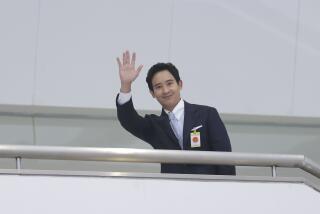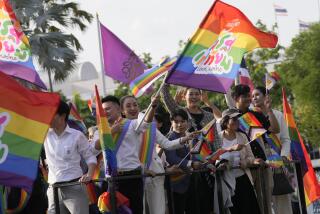Thailand’s lese-majeste law fuels calls for reform
Reporting from Bangkok, Thailand, and New Delhi —
A century-old law allowing up to 15-year prison sentences for those offending Thailand’sKing Bhumibol Adulyadej has sparked controversy and calls for change as its use has increased.
Many who support the lese-majeste statute say it is necessary to uphold the dignity of a king they portray as enlightened and selfless, transcending raucous, corruption-prone Thai politics.
Others say the 1908 law meaning “injured majesty,” with ancient roots that made it a crime to offend a reigning monarch, undercuts free expression and has no place in modern times.
As political tensions in Thailand increased in recent years, capped by bloody protests two years ago that saw farmers, working-class and other “Red Shirt” demonstrators face off against a royalist-leaning government, lese-majeste charges jumped dramatically.
The number of charges rose to 478 in 2010 from 33 in 2005. In 2011, the figure dropped to 85 as protests eased, according to Thailand’s Office of the Judiciary, but many critics remained outspoken about the law.
It’s “an obsolete law not applicable to the modern world,” said activist Surachai Danwattananusorn, 71, speaking through an intercom in the humid visiting room ofBangkok’smain prison days after receiving a 7 1/2-year sentence on three counts of insulting the king.
Surachai, who was convicted in late February, made several speeches in 2010 that were later used as evidence against him. He’s denied doing anything wrong but pleaded guilty in return for a lighter sentence.
In another high-profile case involving vexing jurisdictional issues, Thai-born U.S. citizen Lerpong Wichaikhammat received a 30-month sentence in December for posting a Thai translation online of “The King Never Smiles,” an unofficial biography banned in Thailand, several years ago while living in Colorado. Lerpong, whose American name is Joe Gordon, was arrested last year during a visit to Thailand for treatment of arthritis and high blood pressure. The U.S. government denounced the ruling at the time as excessive and a violation of free speech.
The sharp increase in charges in recent years comes amid growing polarization between supporters of populist former Prime Minister Thaksin Shinawatra, who served from 2001 until he was ousted by the military in 2006, and those favoring the status quo of king and country.
Thaksin lives in self-imposed exile in Dubai, United Arab Emirates, after a 2008 corruption conviction that he says was politically motivated. His sister Yingluck is now prime minister. Despite electoral support from Thais who favor reforming the lese-majeste law, Yingluck’s government has promised not to change it in the face of strong opposition from royalists opposed to Thaksin’s return.
The king “has served the poor people in this country with his projects,” said Tul Sitthisomwong, a doctor at Bangkok’s Chulalongkorn Hospital and vocal royalist, while “people in the government only help people in the places that vote for them.”
Indeed, the 84-year-old king’s Dec. 5 birthday celebration brought tens of thousands of people onto Bangkok’s streets, including Red Shirts keen to demonstrate fealty.
But opponents of the law contend that the number of charges in many recent years suggests it’s been used as a tool to intimidate people whose opinions differ from the establishment.
The law fails to “separate reasonable and truthful comment from insulting and threatening … the monarchy,” said Puangthong Pawakapan, a professor of politics at Chulalongkorn University who favors reform.
With an increasingly polarized electorate, an aging king, a weak government, a conservative judiciary and a divided legislature, few analysts see much chance of the law changing soon. Even Thais advocating reform, including Puangthong, say a majority of the public probably wouldn’t support new rules.
“I’m rather negative about the prospect for reform in the near term,” said Bridget Welsh, a political science professor at Singapore Management University. “Change in Thailand has tended to come after a crisis rather than more incremental. It’s going to take someone who’s bold or has the political space for reform, and I don’t see that now.”
Often unmentioned in public, even with the king hospitalized since September 2009, is what will happen when Crown Prince Vajiralongkorn accedes to the throne.
Royalists’ big fear is that Thaksin and his supporters will become too powerful after the transition, undermining the royalists’ position, said Thongchai Winichakul, a professor of Southeast Asian history at the University of Wisconsin at Madison, speaking recently at Thailand’s Foreign Correspondents Club.
Royalists such as Tul Sitthisomwong believe many Thaksin supporters who favor the law’s reform want to eliminate the monarchy altogether.
For activist Surachai, a former communist guerrilla, it’s time for Thailand to modernize and join the ranks of constitutional monarchies that have watered down or all but eliminated their lese-majeste laws.
“We just want the law updated,” he said, dressed in a dark red prison jumpsuit, “so it is more like countries such as Denmark, Netherlands, Sweden.”
Special correspondent Roughneen reported from Bangkok and Times staff writer Magnier from New Delhi.
More to Read
Sign up for Essential California
The most important California stories and recommendations in your inbox every morning.
You may occasionally receive promotional content from the Los Angeles Times.










